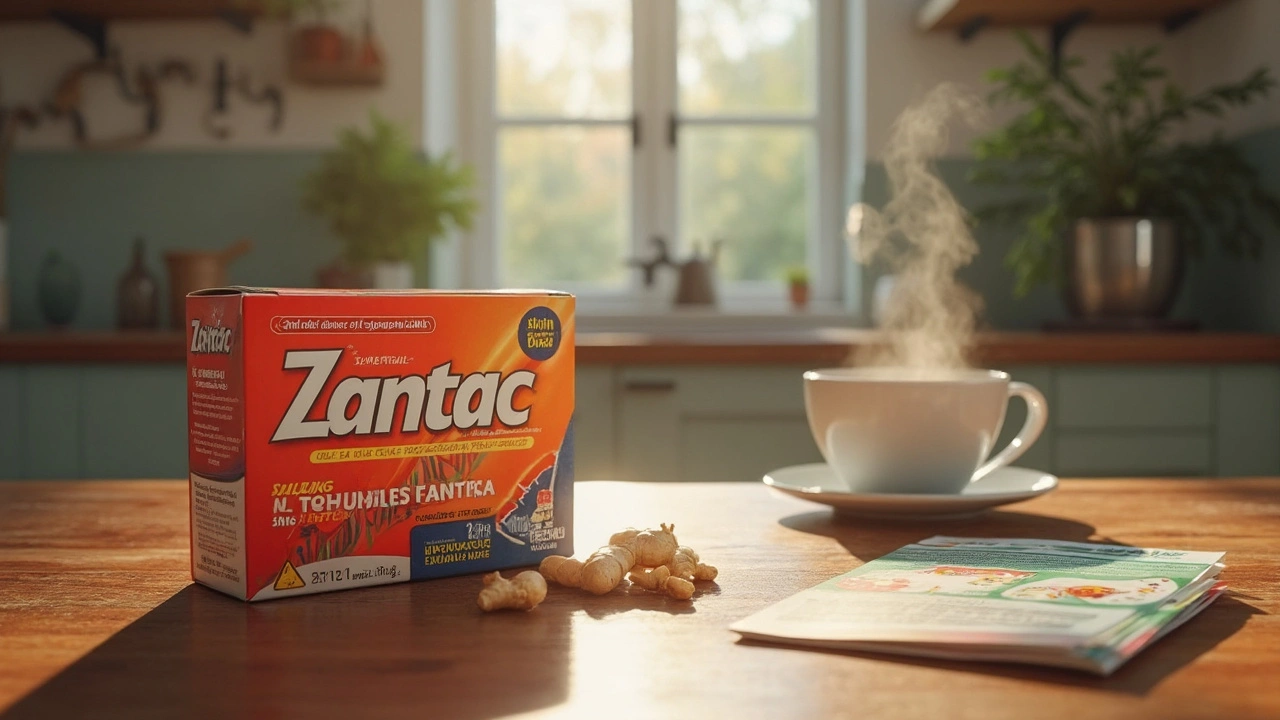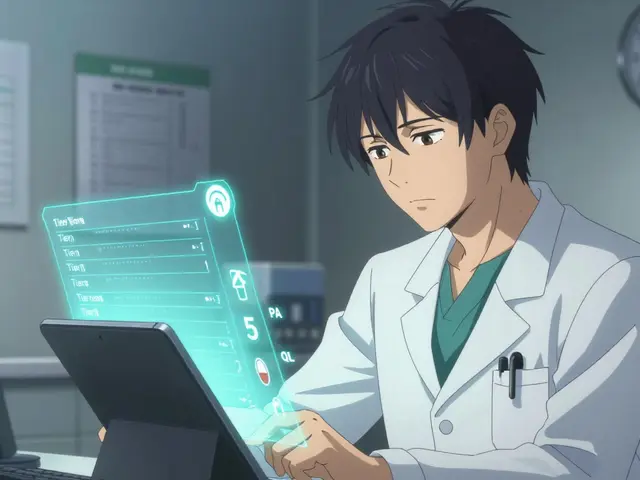
If you’ve ever had heartburn so bad it felt like your chest was on fire, you might remember reaching for Zantac. For decades, this little pill was a bathroom cabinet staple and even sat in my own kitchen drawer, right next to the dinosaur-shaped gummy vitamins my kid Oliver loves. Fast-forward to now, and Zantac isn’t just off pharmacy shelves—it’s become a cautionary tale about drug safety, recalls, and what can go wrong when trust in medicine meets a global health scare.
The Rise and Sudden Fall of Zantac
Zantac, known by its generic name ranitidine, wasn’t just another acid reducer. When it hit the market back in 1983, it quickly stole the spotlight from its competitors. By the late ‘80s, it was the highest-selling prescription drug in the world. Think about that—a pill that outsold everything from antibiotics to aspirins. The reason? Zantac actually worked for many people dealing with chronic indigestion, heartburn, ulcers, and even those nasty nighttime acid flare-ups. A lot of doctors tossed out scripts for it with hardly a second thought.
Things changed big time in 2019. Lab testing found that Zantac and its generics could contain N-Nitrosodimethylamine—NDMA for short. This isn’t just some random chemical with a scary name: NDMA is classified as a probable human carcinogen, meaning it could cause cancer in people. It’s the kind of impurity nobody wants in their medicine. News spread fast. Countries started pulling the drug, and by April 2020, the FDA demanded a total recall of all ranitidine products—prescription and over-the-counter. For something as routine as heartburn medication, the fallout was massive. Shelves cleared overnight, lawsuits started rolling in, and families like mine were stuck scrambling: if Zantac wasn’t safe, what could we use?
Since then, no ranitidine medications have made it back to U.S. stores. The reason is simple: there’s still no guarantee modern manufacturing can keep NDMA out. If you find old ranitidine bottles at home, don’t even think about popping one. Dispose of them properly (your local pharmacy often accepts expired meds) and look for safer options.
What Went Wrong: The Science Behind the Recall
Zantac wasn’t yanked from stores for just one bad batch. The problem turned out to be how ranitidine itself reacts. Scientists figured out that ranitidine molecules can break down over time—especially if the pills are stored in warm or humid places—leading to built-up NDMA. Even some brands stored perfectly showed traces. And we’re not talking trace amounts that show up in just about anything (like bacon or beer!). Some pills contained NDMA at levels well above what the FDA considers safe—a daily limit of 96 nanograms. For perspective, tests found some ranitidine products reached hundreds, even thousands, of nanograms per tablet.
Let’s be clear: NDMA isn’t even safe in low doses for daily use. Animals exposed to NDMA over time grew tumors in their liver, lungs, and kidneys. Human studies are less definitive, but the possible link between NDMA and certain cancers (stomach, bladder, pancreatic) makes taking chances a real gamble. This wasn’t fear-mongering; the chemical really can cause DNA damage. That’s not the sort of thing you want running through your body just to squash heartburn.
Want to see the difference in acceptable versus found NDMA levels? Check this out:
| Product | NDMA Detected (ng) | FDA Safe Limit (ng/day) |
|---|---|---|
| Some Ranitidine Tablets | 500-3,000 | 96 |
| Bacon (3oz serving, for comparison) | 10-15 | 96 |
See how sky-high those numbers are? Every time Oliver asks if something is “a little or a lot,” I pull out charts like this. No contest—it’s a lot.
The real kicker is that NDMA can increase as pills age. So if you had a bottle in your glove compartment for over a year (I’m guilty!), you were running an even bigger risk. Forecasts predict NDMA levels might continue to rise the longer these drugs sit on the shelf or in your home.

Zantac Side Effects, Lawsuits, and the Current Legal Status
Before the NDMA issue made headlines, Zantac was one of those rare drugs with a pretty good safety reputation. Of course, like all medications, it carried some typical side effects: headaches, nausea, constipation, dizziness. But once news of NDMA broke, everything changed. Suddenly, people who’d taken Zantac for years wondered if they were now at risk for more serious problems—specifically, cancer.
On the legal front, things heated up fast. Starting in 2020, lawsuits flooded in. Law firms began airing TV ads, promising payouts to anyone diagnosed with certain cancers after using Zantac. The most common claims cite exposure to NDMA and cancers of the bladder, stomach, and esophagus. Huge class action suits are ongoing, and in 2024, GSK and other Zantac manufacturers agreed to settle some state lawsuits, though that doesn’t mean the story is over. As of now (May 2025), thousands of personal injury cases are still waiting their turn in federal courts. The pharmaceutical companies argue the cancer claims aren’t proven, but families want answers—and sometimes, accountability.
So who should be most concerned? People who took Zantac daily for an extended period are considered at higher risk, compared to those who used it occasionally. But no safe amount has really been established, because even low-level, repeated exposures can add up.
If you’re worried, here’s what you can do:
- Speak with your doctor and share your full medication history. Have a candid talk about your Zantac use and any health concerns.
- If you took Zantac and have been diagnosed with cancer, bring this up with your legal counsel—and your healthcare provider—to see if monitoring or further testing is right for you.
- Dispose of all old ranitidine pills. Do not take them or give them away.
In the bigger picture, Zantac’s fall from grace has changed how we think about drug recalls and manufacturing safety. The FDA is now quicker to demand testing for other medications, especially ones used long-term by millions. Parents like me appreciate the added caution, even if it means saying goodbye to old favorites.
Alternatives to Zantac: Finding a Safer Heartburn Solution
Life with chronic heartburn doesn’t stop just because a popular medicine disappears. Trust me, I’ve had late-night pizza come back to haunt me more times than I’ll admit. So what can you use instead of Zantac that doesn’t carry cancer risks?
The good news: There are several other heartburn medicines still considered safe when used as directed. They fall into three main types:
- Proton pump inhibitors (PPIs): These include omeprazole (Prilosec), esomeprazole (Nexium), and lansoprazole (Prevacid). PPIs are powerful—maybe too much for mild heartburn, but effective for serious acid issues. They block acid production at the source. Downside? Long-term use has been linked to bone loss, kidney issues, and vitamin deficiencies, so ask your doc about the lowest effective dose and regular check-ins.
- H2 blockers (ranitidine alternatives): Cimetidine (Tagamet) and famotidine (Pepcid) are your best bets. After the Zantac recall, Pepcid quickly became the go-to. Both work by lowering acid the stomach makes, but Pepcid doesn’t form NDMA like ranitidine can. Even folks who loved Zantac usually do fine switching to Pepcid with the same dosing schedule.
- Antacids: For quick relief, these are the classics—Tums, Maalox, Mylanta. They don't block acid production but neutralize it for short-term help. No long-term fixes here, but handy for post-movie-night pizza regrets.
Not every heartburn flare needs medicine. Here are some lifestyle tips that actually make a difference:
- Eat smaller meals—giant portions turn your stomach against you.
- Pull back on spicy, fatty, or tomato-heavy foods in the evenings.
- Don’t eat within three hours of bedtime.
- Prop up your upper body at night for gravity’s help.
- Quit smoking. Nicotine weakens the muscle that keeps acid in check.
- Cut back on booze and caffeine if you notice they spark symptoms.
My own routine? I swapped evening snacks for herbal tea, keep Pepcid on hand for emergencies, and stopped buying bargain-size pizza slices (sad but necessary). For folks who can’t get through the day without an acid blocker, talk to your doctor about rotating regimens or exploring prescription-only options. And if you want a complete shake-up, some newer treatments—like alginate-based tablets—coat the stomach and act as a physical barrier to acid. Worth asking about if nothing else works.

Where Things Stand in 2025 and Tips for Staying Safe
So here we are, May 2025. No sign of Zantac or generic ranitidine returning soon. The FDA hasn’t cleared it, the lawsuits keep coming, and trust is still rebuilding for both doctors and patients. The bigger impact? More people are reading medication labels, heading online to check recalls, and having real talks with their doctors about what’s safe. It’s actually turned us into smarter consumers—myself included. Now, Oliver wants to know why I read bottles for more than just the flavor.
If you want to avoid the next Zantac-style surprise, here’s how to stay ahead:
- Sign up for the FDA’s drug recall alerts. They’re free and let you quickly see what’s safe and what’s not.
- Store medicines in cool, dry places—even small heat/humidity changes can mess with chemical stability.
- Check expiration dates every few months. Older meds carry higher risks if breakdown occurs.
- If you see headlines about a heartburn or other common drug being tested for impurities, ask your pharmacist about safe options. Pharmacies tend to know the latest before the rumor mill heats up.
- Never double up on doses thinking it’s safer—always follow dosing just as you would with a brand-new prescription.
- Talk openly with your doctor. If something doesn’t work, don’t suffer in silence for trust’s sake. There really are lots of alternatives now.
For those navigating lawsuits or health scares related to zantac, hang in there. The legal system moves slowly, but patient advocacy groups keep sharing stories and pushing for research. If nothing else, know you aren’t alone in worrying about what’s really in your medicine chest. And if you’re like me, you might just rethink how often you grab the spicy tacos after bedtime.





Jane Grimm
May 29, 2025 AT 23:50It is profoundly disquieting that a medication once celebrated for its efficacy could harbor a probable carcinogen. The very premise of prescribing Zantac without exhaustive stability testing betrays a reckless disregard for patient safety. Manufacturers ought to have instituted rigorous analytical controls long before the 2019 disclosures. Moreover, regulatory agencies share culpability for permitting the drug's continued circulation amid emerging data. One must lament the erosion of public trust resulting from such systemic negligence. In the grand tapestry of pharmaceutical stewardship, this episode stands as a cautionary testament to hubris. Let us demand uncompromising transparency and ethical rigor in all future drug evaluations.
Nora Russell
May 30, 2025 AT 03:53While Ms. Grimm's impassioned lament is rhetorically forceful, it regrettably eschews a calibrated assessment of the underlying pharmacokinetic mechanisms. A meticulous examination reveals that NDMA formation is intrinsically linked to the nitrosation of dimethylamine under thermally stressed conditions-a phenomenon that, albeit undesirable, is not inexplicable. The industry’s failure stems less from moral turpitude than from an underestimation of degradation kinetics in real‑world storage environments. Furthermore, the FDA’s post‑market surveillance apparatus, though ostensibly reactive, has nonetheless facilitated the identification of outlier batches. One must therefore temper moral outrage with a sober appreciation of the complex interplay between chemical stability, supply‑chain logistics, and regulatory oversight. In sum, the Zantac saga is less a simple narrative of villainy and more a multifaceted failure of systemic rigor.
Craig Stephenson
May 30, 2025 AT 09:26Hey everyone, I totally get the frustration-dealing with heartburn is enough of a hassle without worrying about hidden chemicals. If you’re looking for a practical step right now, start by checking your medicine cabinet and tossing any leftover ranitidine into a pharmacy take‑back box. I’ve found that swapping to famotidine or a low‑dose PPI after a quick chat with my doctor keeps the burns at bay without the NDMA nightmare. Also, simple lifestyle tweaks like avoiding late‑night heavy meals can make a huge difference. Let’s keep sharing what works for us so nobody feels stuck with the old Zantac habit.
Tyler Dean
May 30, 2025 AT 12:13The government and pharma collude to hide the truth about Zantac.
Susan Rose
May 30, 2025 AT 16:23Craig, absolutely! In many cultures, herbal teas and spice‑free broths are the go‑to remedies for indigestion, and they can be just as effective as a pill when paired with mindful eating. I’ve seen families in the Midwest swap soda for ginger‑infused water after dinner, and the difference in heartburn frequency is noticeable. It’s also worth noting that community health workshops often promote these traditional practices, making them accessible beyond the pharmacy aisle. So, while modern meds have their place, don’t underestimate the power of cultural wisdom in keeping the gut happy.
diego suarez
May 30, 2025 AT 19:10It is prudent to approach the Zantac issue with both caution and openness, recognizing that the scientific data on NDMA exposure is still evolving. Patients should feel empowered to discuss their medication histories with healthcare providers, without feeling judged or dismissed. Simultaneously, manufacturers must commit to transparent reporting of impurity analyses, and regulators should enforce stricter shelf‑life specifications. By fostering a dialogue that respects evidence‑based medicine while acknowledging individual concerns, we can navigate the aftermath of the recall more constructively.
Eve Perron
May 30, 2025 AT 23:20When evaluating the ripple effects of the Zantac recall, one must first consider the epidemiological data that have emerged over the past six years, which suggest a modest but statistically significant uptick in reports of gastrointestinal cancers among long‑term users. This observation, while not establishing causation, aligns with mechanistic studies demonstrating that NDMA can induce DNA adduct formation in hepatic and gastric tissues, thereby potentiating oncogenesis. Moreover, the pharmacological community has taken note of the temperature‑dependent degradation pathways, prompting a reevaluation of storage recommendations not only for ranitidine but for a broader class of labile compounds. The FDA’s subsequent guidance on accelerated stability testing reflects an institutional learning curve that, regrettably, arrived after considerable patient exposure. From a clinical perspective, the substitution of famotidine or a low‑dose proton pump inhibitor should be undertaken with a clear understanding of each agent’s risk‑benefit profile, especially given emerging concerns about long‑term PPI use and micronutrient malabsorption. In practice, many physicians now employ a step‑down strategy: initiating therapy with a short‑acting H2 blocker during acute flares, transitioning to intermittent use of antacids for maintenance, and reserving PPIs for refractory cases. Patient education remains a cornerstone of this paradigm shift; individuals must be instructed on reading expiration dates, recognizing signs of medication degradation, and utilizing pharmacy take‑back programs. Additionally, lifestyle interventions-such as weight reduction, dietary modification to limit acidic foods, and elevation of the head of the bed-can substantially diminish reliance on pharmacotherapy. It is also noteworthy that newer therapeutic modalities, including alginate‑based formulations that create a buoyant barrier atop gastric contents, have entered the market with promising safety data, though long‑term outcomes remain to be fully elucidated. On the legal front, the cascade of class‑action lawsuits has catalyzed a broader discussion about corporate accountability and the adequacy of post‑marketing surveillance. Settlements, while providing immediate relief to some claimants, do not substitute for systematic reforms aimed at preventing future recalls of comparable magnitude. As we move forward into the latter half of the decade, collaborative efforts among clinicians, scientists, regulators, and patient advocacy groups will be essential to reestablish trust and to ensure that drug safety assessments are both rigorous and transparent. Ultimately, the Zantac episode serves as a sobering reminder that vigilance must be perpetual, lest we repeat history’s avoidable missteps.
Josephine Bonaparte
May 31, 2025 AT 02:06Wow Eve, that was a monster of a post-super thorough and totally on point! I love how you broke down the science, the legal stuff, and even the new treatments in one go. Sorry if my spelling’s a little off, but you’ve definitely given us all a solid roadmap to stay safe and push for better drug oversight. Keep the epic breakdowns coming!